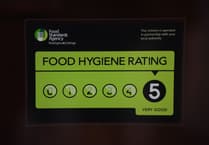TWO schoolgirls from Teignbridge have scooped £5,000 in a national competition run by the UK Space Agency. The sky was the limit for teenage scientists Lauren Paton, 15, of Abbotskerswell, and 16-year-old Ella Sheffield from Chudleigh Knighton.
Their bright idea to harness satellite data to tighten security in prisons landed them the top prize in their age group. Judges deemed their bright idea worthy of the competition’s objective to ‘improve life on Earth.’
Lauren said: ‘When we heard about the competition we thought it was a really interesting opportunity...something that was fun. ‘We’re doing our GCSEs, so we worked on it after school and on a weekend. We’re so pleased we’ve won.’
Ella chipped in: ‘We were really shocked when we heard we had won. We spoke to our headmaster and our science teachers and they were really pleased for us.’ She plans to invest her share of the prize money in helping to finance studies at university where she hopes to read engineering.
The SatelLife Challenge competition was looking for inspirational ideas, from those aged 11 to 22, linking satellite and space data and its application to everyday life.
Emily Gravestock, Head of Applications Strategy at the UK Space Agency, said: ‘We were really impressed by the number of innovative ideas submitted to the SatelLife Challenge and Lauren and Ella are certainly worthy winners.’
She added: ‘The judges thought their idea was well researched - and novel - using technology in a way they had not seen before. We think they have real potential as space entrepreneurs of the future.’
The dynamic duo’s bright idea used observation satellites to track movement surrounding prisons. This would help identify and disrupt the supply of drugs, using navigation to better understand the movement of prisoners using tags. Their goal was to improve prison security and cut NHS costs by reducing drug taking in prisons. Both are pupils at Torquay Girls’ Grammar School.
The competition - intended to support the development of science, data handling and technological skills - was split into three age groups, offering prizes of £5,000 for each age category with the overall winner receiving £10,000. The judging panel was made up of experts including representatives from the UK Space Agency, the Satellite Applications Catapult in Harwell and industry figures. Overall winner was 13-year-old James Pearson from Boston in Lincolnshire.
All category winners will now be able to pitch their idea to a panel of industry experts or ‘dragons’ from the space sector who will offer further prizes. These could include mentoring, work experience and even the development of the idea into reality.
The best entries will also be invited to present their idea at the UK Space Conference which is the most influential event for space in the country. It’s held in Manchester from May 30 to June 1.





Comments
This article has no comments yet. Be the first to leave a comment.